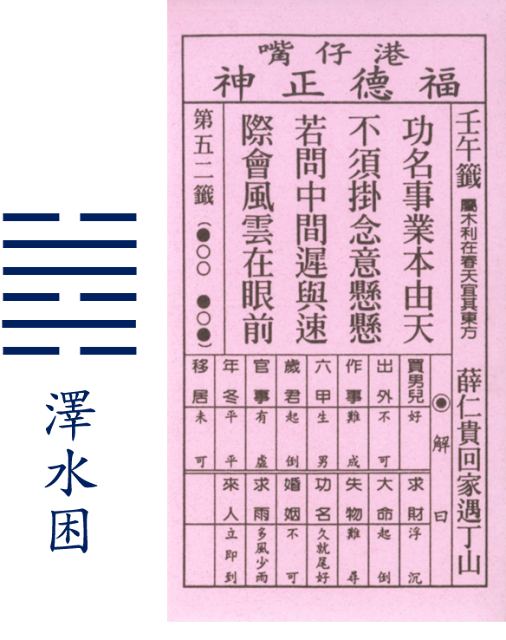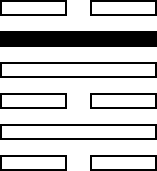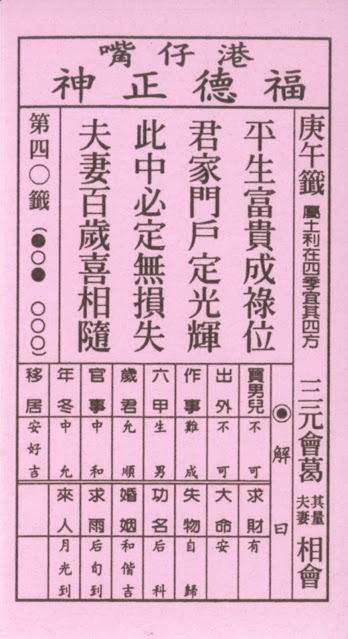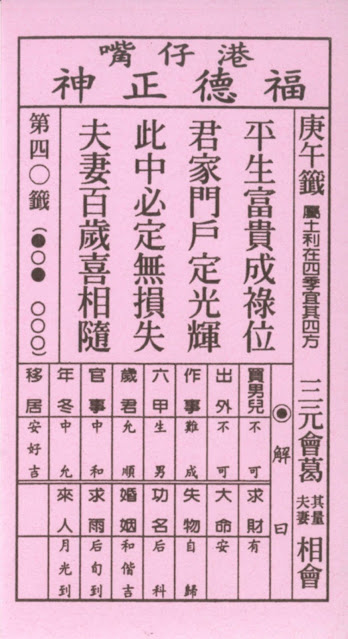第52籤 困卦 52th DMP: Kun
困:亨,貞大人吉,無咎。有言不信。
初六:臀困于株木,入于幽谷,三歲不覿。
九二:困于酒食,朱紱方來,利用享祀,征凶,無咎。
六三:困于石,據于蒺蔾,入于其宮,不見其妻,凶。
九四:來徐徐,困于金車。吝,有終。
九五:劓刖,困于赤紱,乃徐有說。利用祭祀。
上六:困于葛藟,于臲卼,曰動悔有悔,征吉。
Six at the beginning means: Trapped with a cane (corporal punishment), placed in a deep valley (in solitary confinement, exile or self-isolation). Haven't seen anyone for many years.
株木:
刑杖。
Torture rod.
蒺蔾:
音同「疾離」,一種果實具刺狀物的草。
刖:
音同「月」,古代把腳砍掉的一種酷刑。
The sound is the same as "yue," a torture in which the feet were cut off in ancient times.
臲卼:
初六:臀困于株木,入于幽谷,三歲不覿。
九二:困于酒食,朱紱方來,利用享祀,征凶,無咎。
六三:困于石,據于蒺蔾,入于其宮,不見其妻,凶。
九四:來徐徐,困于金車。吝,有終。
九五:劓刖,困于赤紱,乃徐有說。利用祭祀。
上六:困于葛藟,于臲卼,曰動悔有悔,征吉。
---------------------------
註:大部份的易經書籍,爻詞斷點均以逗號標註。本宮以文法邏輯判斷略作調整。
---------------------------
Kun: There is still a way to go smoothly. Adhering to the strength of one's due character is peace without guilt. At this time, because you are a small person, even if what you said is true, few people will adopt it.
Six at the beginning means: Trapped with a cane (corporal punishment), placed in a deep valley (in solitary confinement, exile or self-isolation). Haven't seen anyone for many years.
株木:
刑杖。
Torture rod.
三歲:
三年,古人以三為多的意思,所以是指時間很長,並不一定真的是三年。
覿:
音同「狄」,相見的意思。
The sound is the same as "di", meaning to meet.
音同「狄」,相見的意思。
The sound is the same as "di", meaning to meet.
---------------------------
Nine in the second place means: Because of poverty, there is no food and drink available. It's time for a high-ranking official to come to offer sacrifices, people can receive sacrifices what to the gods. There will be bad things in the fight for robbery. No guilt.
朱紱:
音同「朱服」,古代禮服上的紅色蔽膝。屬天子諸侯及公卿的祭典官服中的配件,後引申指高官顯貴。
音同「朱服」,古代禮服上的紅色蔽膝。屬天子諸侯及公卿的祭典官服中的配件,後引申指高官顯貴。
The sound is the same as "Zhufu", the red cloth on the ancient dress covers the knees. The accessories of ceremonial official uniforms of the emperor, dukes and the high class public officials for rite. Later, it was extended to refer to high-ranking officials.
---------------------------
Six in the third place means: Trapped in the rocks, guarded on the tribulus (scarce resources). It's not good to walk into the house without seeing your wife (no relatives or friends).
蒺蔾:
音同「疾離」,一種果實具刺狀物的草。
維基百科:蒺蔾
Sounds the same as "Ji Li", named Tribulus terrestris in English, a kind of grass with thorny fruit.
Wiki:Tribulus terrestris
Sounds the same as "Ji Li", named Tribulus terrestris in English, a kind of grass with thorny fruit.
Wiki:Tribulus terrestris
---------------------------
九四:來徐徐,困于金車。吝,有終。
位於第四層的陽爻:機會或資源到來的速度緩慢,滯留於華貴的車中。過程中有些不好的事發生,但最後機會或資源還是會到來。
Nine in the fourth place means: Opportunities or resources come slowly and stay in luxurious cars. Bad things happen along the way, but the final opportunity or resource will come.
金車:
用銅作裝飾的車駕。古時金屬得之不易,所以金車又指華貴的車駕。
A carriage decorated with copper. In ancient times, metal was not easy to obtain, so the kind of carriage also refers to the luxurious carriage.
---------------------------
九四:來徐徐,困于金車。吝,有終。
位於第四層的陽爻:機會或資源到來的速度緩慢,滯留於華貴的車中。過程中有些不好的事發生,但最後機會或資源還是會到來。
Nine in the fourth place means: Opportunities or resources come slowly and stay in luxurious cars. Bad things happen along the way, but the final opportunity or resource will come.
金車:
用銅作裝飾的車駕。古時金屬得之不易,所以金車又指華貴的車駕。
A carriage decorated with copper. In ancient times, metal was not easy to obtain, so the kind of carriage also refers to the luxurious carriage.
---------------------------
Nine in the fifth place means: Severe penalties have stagnated affairs at a certain level. Facing difficult transitions, we need to calmly and carefully discuss before we can smoothly apply the power of faith to tide over the difficulties.
劓:
劓:
音同「意」,古代割掉鼻子的一種酷刑。
The sound is the same as "yi," a type of torture in which the nose is cut off in ancient times.
The sound is the same as "yi," a type of torture in which the nose is cut off in ancient times.
刖:
音同「月」,古代把腳砍掉的一種酷刑。
The sound is the same as "yue," a torture in which the feet were cut off in ancient times.
---------------------------
位於最上方的陰爻:困於長期發展而出的綿密人、事負累與動搖不安中,行動時需隨時檢討並作滾動式修正。勇於執行改變會有好的結果。
Six at the top means: Trapped in the long-term development of dense people, burdened and vacillating, it is necessary to review and make rolling corrections at any time during actions. The courage to implement changes will have good results.
Six at the top means: Trapped in the long-term development of dense people, burdened and vacillating, it is necessary to review and make rolling corrections at any time during actions. The courage to implement changes will have good results.
葛藟:
音同「格磊」,葡萄的一種。在台灣稱為光葉葡萄。葡萄為爬藤植物,長期野生發展的結果使其彼此間的莖相互牽連,有如彼此相連的綿密人、事。
維基百科:葛藟
The sound is the same as "ge lei," a kind of grapes. Its scientific name is Vitis flexuosa.
Wiki:Vitis flexuosa
音同「格磊」,葡萄的一種。在台灣稱為光葉葡萄。葡萄為爬藤植物,長期野生發展的結果使其彼此間的莖相互牽連,有如彼此相連的綿密人、事。
The sound is the same as "ge lei," a kind of grapes. Its scientific name is Vitis flexuosa.
Wiki:Vitis flexuosa
臲卼:
音同「聶物」,動搖不安的樣子。
The sound is the same as "nie wu," an uneasy look.
---------------------------
卦爻匯意:
在外在際遇無路可走時,要以「大人」的胸懷努力發展內在事業(學問、品行),使其更加豐盛溫潤,如此便能順遂平安,開創另一番成就。
---------------------------
史上符合困卦的例子:
Historical examples that fit the Kun:
蘇武:
蘇武是中國西漢出使匈奴的使節,被匈奴首長單于扣留,將他流放到北海放牧牛羊,不供應糧食,意圖迫使他投降,但沒有如願。【初六】
過了五、六年,單于的弟弟於靬王到北海打獵。蘇武因為會編獵網及矯正弓弩而受到器重,於靬王便供給他衣食及穹廬(又稱蒙古包,遊牧民族的居室)。【九二】 💬靬:音同「間」。
過了三年多,於靬王病死,部下徹離,他賜給蘇武的牲畜在那年冬天遭人盜走,蘇武的生活再度陷入困境。【六三】
漢廷與匈奴議和後,希望迎回蘇武,單于一度謊稱他已亡故。經眾人努力,蘇武在北海熬了19年後終於回到漢都,並被授予官職。【九四】
回國一年後,蘇武之子蘇元因參與他人的謀反工作被處死,蘇武亦被免官。【九五】
六年後新皇帝以蘇武通悉典章制度、出使持節不降等理由將其封侯,並使其再度入朝為官尊稱為「祭酒」,還幫他贖回在匈奴與當地女子生下的兒子蘇通國並給予官職。蘇武去世後,被列為麒麟閣十一功臣之一。【上六】
Su Wu:(140 BC - 60 BC)An official of the Western Han Dynasty of China.
---------------------------
補充資料:朱與赤
朱與赤都是紅色,差別在於朱為正紅色,而赤的顏色較暗。
Both Zhu(朱) and Chi(赤) are red, the difference is that Zhu is a positive red, while Chi is darker.
Ancient Chinese official uniforms had strict color distinctions. Zhu was used by the emperor, princes, or high class public officials, and Chi was used by lower ranks. For example: King Wen of Zhou was a Duke under the Shang Dynasty, and he could only wear Chi(赤) vestment in the area of Shang. But he could wear Zhu(朱) vestment on his fief.
-----------------------------------------------------
籤頭故事解籤
The Stories and Their Metaphors on the Divine Metaphor Papers
第52籤 薛仁貴回家遇丁山
-----------------------------------------------------
困的異體字(摘自漢典)













留言
張貼留言